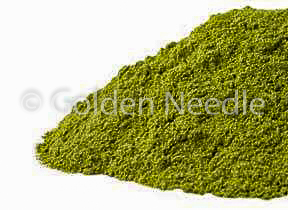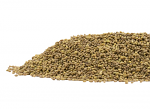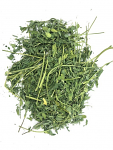Alfalfa Leaf Powder, Organic (Medicago sativa)

Alfalfa Leaf Powder, Organic (Medicago sativa)
| SKU | MR1006A | |
| Brand | Mountain Rose | |
| Unit Size | 1lb | |
| Recommendations | Product will ship FedEx Ground, even if Expedited is selected. Call for expedited shipping rates. |
|
| Description | Parts UsedDried leaves and sprouted seeds. Alfalfa is well known as a feed plant for livestock yet has had a rich tradition of use as a healing herb as well. Utilized since ancient times for its high nutrient value, Arabs fed it to their horses to increase strength and stamina. In traditional folk medicine, it has been administered as a nutritive tonic and was found to be particularly useful in cases of malnutrition or during convalescence. The dried alfalfa leaf is widely available in herbal shops and health food stores as an herbal tea, tablet, powder or made into a liquid chlorophyll supplement. The seed is often sprouted and eaten in salads and sandwiches.
BotanyAlfalfa is a long-lived perennial in the Fabaceae (or is sometimes put in the Papilionaceae) family1 with leguminous flowers which vary in color from purple to yellow, trifoliate clover-like leaves, and a deep penetrating tap root2 (some sources say that taproots have been found reaching down 68 feet into the soil!).3 Alfalfa is native to southwest Asia with wild species occurring in the Caucasus, and in mountainous regions of Afghanistan and Iran, and is very widely cultivated throughout the world.4 Cultivation And HarvestingThe US is the leading producer of alfalfa, and within the country, California, Montana, and Idaho are the major producing states.5 Alfalfa is the fourth largest crop by acreage, grown on 23 million acres,6 and is third in value, after corn and soybeans. Its national value is more than $8 billion each year.6 Alfalfa is best harvested for medicinal purposes when in bloom.3 History And FolkloreAlfalfa remains more than 6000 years old were found in Iran6 and it is believed that the domestication of alfalfa first began in the Bronze Age most likely somewhere between 1000 and 2000 BCE (probably near the countries of Turkmenistan, Iran, Turkey, and the Caucasus mountains).6,7 Alfalfa was important to the early Babylonian cultures, the Arabs, the Persians, the Greeks, and the Romans as it was used for feeding the warrior's horses (which were domesticated in Central Asia at about 2500 BCE).7 Accordingly, the name 'alfalfa' is derived from the Arabic al-fisfisa and means 'a green (or fresh) fodder'.8 By 400 BCE, Lucerne was being grown in Europe.7 In the U.S, the early colonists, with such esteemed members including Thomas Jefferson and George Washington, grew alfalfa.6 However, it was not widely cultivated across the country until the California Gold Rush of 1849 because, at this time, much of the equipment used to directly or indirectly support the mining efforts was animal-powered thus requiring large amounts of livestock feed.6 Alfalfa is considered the foremost forage plant for dairy cows as it increases their milk production.6,9 Not only does it provide nutrient dense hay, it is also a source of leaf meal used to fortify baby foods and a variety of other foods that are prepared to support weight gain and supply vitamins and minerals.2,10 It is fed to chickens and rabbits and utilized in gardening and large scale agriculture. It is a "nitrogen fixer" like many legumes.3,11 Alfalfa not only provides healing nutrients for humans, but it helps to "heal" soil as well and makes an effective "green manure" for providing nutrients to poor soil.3 Alfalfa was used in traditional Chinese medicine (TCM), making its first appearance around 200 CE during the Han Dynasty, for digestive system support and to stimulate the appetite.3 Alfalfa was revered for its soothing and strengthening properties. It became available around the 1850's to the Native Americans who adopted it into their healing system and referred to it as 'Buffalo grass'. They would grind up the seed into flour and put in gruels and bread and also ate the young leaves and shoots.3 In India, alfalfa seeds have been applied topically as a cooling poultice.4 The leaves are a source for the dietary supplement chlorophyll,10 and the seeds are used to make a yellow dye.4,11 In parts of China and Russia young alfalfa leaves have been served as a vegetable.4 In traditional medicine of Europe and the U.S., alfalfa has been used to stimulate appetite10,11,12 support urinary and bowel function,10,12 and as a diuretic.12 Further, due to alfalfa's nutrient density10,13 it has been utilized for providing easy to assimilate nutrients during convalescence.11 Additionally, it has been administered for not only increasing milk production in dairy cows but in lactating woman as well.10 It is recommended for use as a tonic after blood loss or in cases of insufficient levels of iron in the blood.14 In Mathew Wood's book, the Earthwise Herbal, alfalfa is portrayed as a soothing herb for calming the nervous system that is particularly useful for the type of person that is really busy, always on the go, and is very time conscious.15 Alfalfa is an alkalizing plant that has complex and seemingly opposite flavors of bitter and sweet and therefore both stimulates and regulates stomach secretion.15 Alfalfa aids in healthy digestion due to its fiber content which gives this herb a slightly laxative effect and also supports the structure of the intestinal walls.15 It has been used in money spells, as it is believed to combat poverty and attract financial abundance. Further, placing it in the home in a jar or sprinkling its ashes around the house was thought to protect the inhabitants from hunger.16 Flavor Notes And EnergeticsThe tastes are sweet, bitter, and earthy. It is energetically cooling.15 Herbal ActionsAppetite stimulant, diuretic, tonic,4,14 nutritive,14 laxative14,15 estrogenic.15 Uses And PreparationsDried leaves as tablets, teas, tinctures or encapsulated. Constituents2-3% saponins, sterols, alcohols, flavones and isoflavones (including phytoestrogens such as genistein and daidzein) coumarin derivatives, alkaloids, plant acids (including malic and oxalic acid) vitamins A, B1, B6, B12, C, E, K1, niacin, pantothenic acid, biotin, folic acid, amino acids (including valine, lysine, arginine, tryptophan, sugars, plant pigments such as chlorophyll, 17-25% crude fibers, 15-25% protein, minerals, and trace elements such as calcium, potassium, phosphorus, magnesium, iron, zinc, and copper.10,13
Scientific ResearchAlfalfa is one of the most studied plants due to its usefulness as livestock feed, however human clinical studies are sparse.10 |
|






